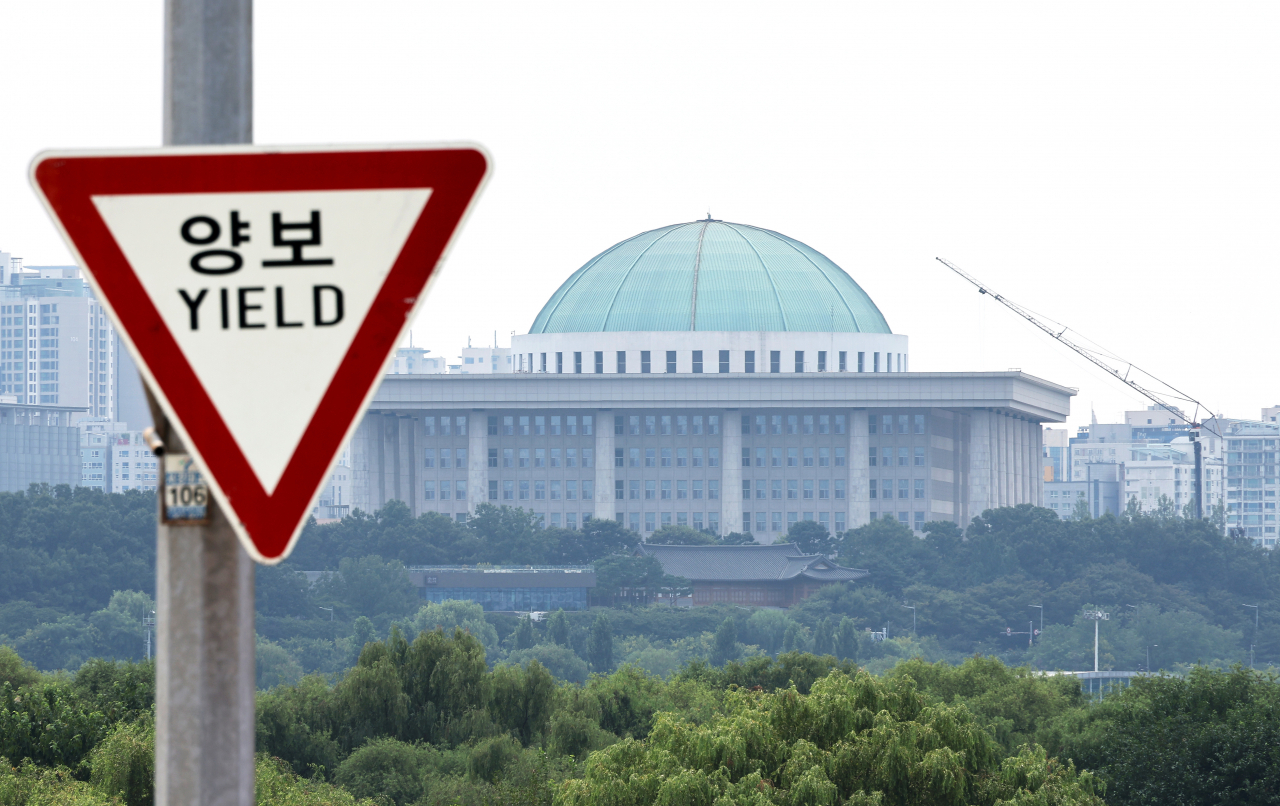 |
The National Assembly in Yeouido, western Seoul (Yonhap) |
Partisan gridlock in the National Assembly is unlikely to cease in upcoming weeks, with the opposition-led parliament having either passed or eyeing to vote in favor of more contentious bills, which President Yoon Suk Yeol is expected to veto.
The opposition-led National Assembly late last month passed four broadcasting bills aimed at reducing the Yoon administration’s influence over public broadcasters, alongside a pro-labor revision bill to the Trade Union and Labor Relations Adjustment Act called the “Yellow Envelope Bill,” which seeks to cap employers’ ability to make damage claims against unions for legal labor disputes. Three of the four broadcasting bills and the Yellow Envelope Bill were already vetoed by Yoon last year.
The main opposition Democratic Party of Korea, which controls a clear majority with 175 of the total 300 seats in the single chamber parliament, revived the contentious bills after the term of the 22nd Assembly kicked off in late May.
The Democratic Party said it plans to hold a plenary vote for the Yellow Envelope Bill during a parliamentary session scheduled for Monday, despite the ruling People Power Party’s protest. The People Power Party staged a 31-hour filibuster from Friday to Sunday in an attempt to stall the passage of the bills.
On top of the broadcasting bills and the Yellow Envelope Bill, the Assembly on Friday passed a bill for the central and local governments to provide universal cash payments of 250,000-350,000 won ($180-$252) per citizen in the form of vouchers to be used locally. The program was a key parliamentary election pledge by Rep. Lee Jae-myung, the Democratic Party’s former chair who is currently running in the party leadership race to clinch a second term.
Yoon is expected to veto the four broadcasting bills, the Yellow Envelope Bill and the cash voucher program by the end of this month, as he is legally required to issue his decision within 15 days of the bills being delivered to his Cabinet by the Assembly.
People Power Party Floor Leader Rep. Choo Kyung-ho on Sunday denounced the Democratic Party's moves to table and pass the contentious bills through the opposition-led Assembly as a “maneuver” to increase the president's veto count and ultimately bring impeachment charges against him.
"The Democratic Party's intention is a maneuver to increase the number of times (Yoon) exercises his presidential veto and abuse it to incite impeachment (against Yoon)," Choo said via Facebook.
"(The Democratic Party) must halt its irresponsible impeachment politics," he continued.
On the other side of the political spectrum, acting Democratic Party Chair and Floor Leader Rep. Park Chan-dae emphasized the significance of the opposition's plan to pass the three broadcasting bills into law.
Speaking to reporters outside the May 18 National Cemetery in Gwangju on Sunday, Park criticized the ruling party's resistance, labeling it as "Yoon's attempt to suppress the freedom of the press."
Yoon has so far exercised his veto power 15 times since taking office in 2022, the second-most number of vetoes by any president in the country's history.
Under current law, the president cannot be impeached over exercising his veto power over a certain number of bills, but supporters of Yoon have expressed concerns that it could work as a key factor bringing down the current president’s already low approval rating.
A recent online petition calling for the parliament to draft a bill to impeach Yoon submitted via the National Assembly website garnered some 1.4 million signatures after it was uploaded on June 20.







![[Today’s K-pop] Blackpink’s Jennie, Lisa invited to Coachella as solo acts](http://res.heraldm.com/phpwas/restmb_idxmake.php?idx=644&simg=/content/image/2024/11/21/20241121050099_0.jpg)